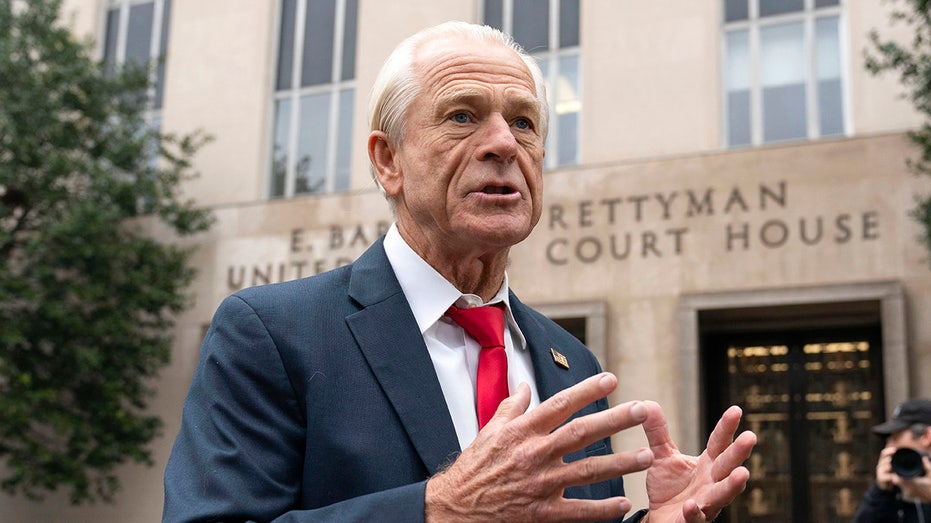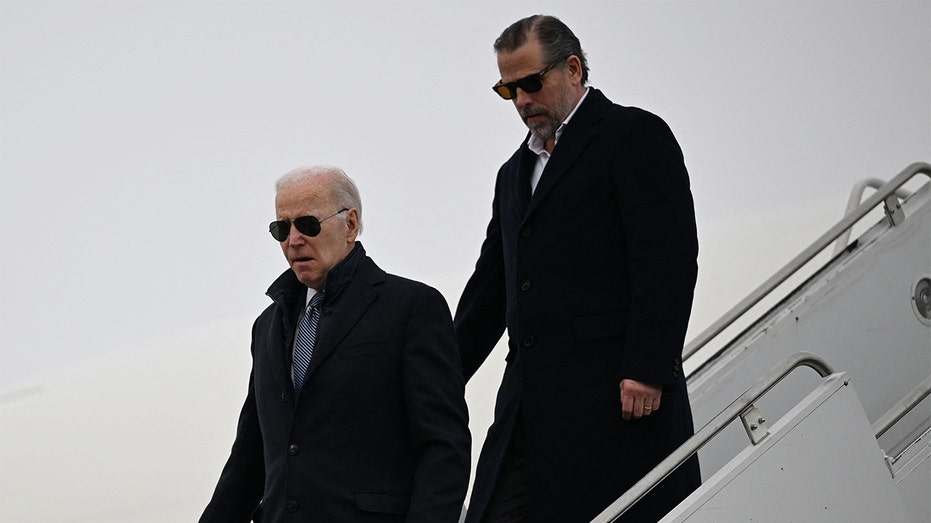Peter Navarro, who served in the White House under former President Donald Trump, was sentenced Thursday for flouting a House Jan. 6 committee subpoena.
U.S. District Judge Amit Mehta sentenced Navarro to four months in prison and ordered him to pay a fine of $9,500.
That’s two months shorter than the six prosecutors had sought, but Mehta drastically reduced the whopping $200,000 fine sought by the Justice Department.
A former adviser to the president on trade and manufacturing policies, Navarro was convicted in September of two counts of contempt of Congress for defying a subpoena for documents and a deposition from the House select committee investigating the Jan. 6, 2021, riot at the U.S. Capitol. The subpoena required Navarro to appear and produce documents in February 2022, and sit for a deposition in March 2022, but Navarro refused to provide the materials and testify. As a private citizen, he was indicted on June 2, 2022.
In announcing the sentencing decision, Mehta cited how Navarro had claimed a “two-tier system of justice” and described the Jan. 6 committee as a “kangaroo court.”
“I have made clear my confusion about his arrest when he could have been offered self-surrender… The idea that he is subject to a two-tiered system of justice when he’s sitting here with 4 very capable lawyers is a real head-scratcher,” the judge said. “The words executive privilege are not magical dust… it’s not a get out of jail free card. To not engage with the committee to work through the issues… to simply not engage, there’s no basis for it.”
Mehta on Thursday had gone through a tedious recounting of the sentencing guidelines and came to the conclusion that there is a “zero to six months range,” of imprisonment in this case, as well as a fine range of $500 to $9,500. Sentencing guidelines are only a suggestion, and the judge could have sentenced Navarro to a longer sentence if he saw fit.
At the sentencing hearing, Navarro spoke in his own defense, saying he defied the subpoena because he believed in “good faith” that Trump had invoked executive privilege.
“When I received that congressional subpoena, the second, I had an honest belief that the privilege had been invoked, and I was torn. Nobody in my position should be put in conflict between the legislative branch and the executive branch. Is that the lesson of this entire proceeding? Get a letter and a lawyer? I think in a way it is,” Navarro said. “I am disappointed with a process where a jury convicted me, and I was unable to provide a defense, one of the most important elements of our justice system.”
DOJ RECOMMENDS 6 MONTH SENTENCE FOR FORMER TRUMP ADVISER PETER NAVARRO
“The day of the attack on our Capitol was one of the worst days of my life. Desecration of our Capitol and the end of any argument about the Vote Count law on our books,” he added.
Navarro’s defense attorney said the court of appeal will determine if executive privilege applies. The judge noted how in citing executive privilege, another White House adviser, Kellyanne Conway “had an (DOJ Office of Legal Counsel) OLC opinion she could rely on,” but Navarro had no such opinion and didn’t hire representation.
“I have a great deal of respect for your client and what he accomplished and that makes it more disappointing,” Mehta said, also noting that Mark Meadows, who also faced a Jan. 6 committee subpoena, “produced documents, produced texts, he didn’t testify, but at least he did something.”
“Before he was contacted, what they wanted. He responded, ‘Executive Privilege.’ That makes it clear that this defendant did not take this seriously. The defendant simply defied Congress. The defendant believes that he is above the law,” a prosecutor said of Navarro in addressing the court Thursday. “The things the committee wanted to talk to him about were not exclusively about conversations he had with the president.”
Prosecutors had asked the judge to sentence Navarro to six months behind bars and impose a $200,000 fine. The Justice Department has previously noted that each count of contempt of Congress carries a minimum of 30 days and a maximum of one year in jail, as well as a fine of up to $100,000.
FORMER TRUMP ADVISER NAVARRO CONVICTED OF CONTEMPT AFTER DEFYING JAN. 6 SUBPOENA
“The United States vs. Peter Navarro has turned out to be a very important landmark constitutional case. That is going to resolve important issues about the constitutional separation of powers as well as, the integrity, efficiency of presidential decision-making. And we’ll see what happens today. Is that what Trump loves to say? Let’s see what happens,” Navarro told reporters upon arriving at the courthouse Thursday morning. He said his legal bills associated with the case have surpassed $1 million and thanked 20,000 small donors for their help.
He also appealed to supporters to donate to help cover his legal expenses at defendpeter.com.
Navarro has vowed to appeal the verdict, saying he couldn’t cooperate with the committee because Trump had invoked executive privilege.
The judge barred him from making that argument at trial, however, finding that he didn’t show Trump had actually invoked it. Justice Department prosecutors say Navarro tried to “hide behind claims of privilege” even before he knew exactly what the committee wanted, showing a “disdain” for the committee that should warrant a longer sentence.
Defense attorneys said Trump did claim executive privilege, putting Navarro in an “untenable position,” and the former adviser should be sentenced to probation and a $100 fine.
Navarro was the second Trump aide to face contempt of Congress charges. Former White House adviser Steve Bannon was convicted of two counts and was sentenced to four months behind bars, though he has been free while appealing his conviction.
Navarro’s sentencing comes after a judge rejected his bid for a new trial. His attorneys had argued that jurors may have been improperly influenced by political protesters outside the courthouse when they took a break from deliberations. Shortly after their break, the jury found him guilty of two misdemeanor counts of contempt of Congress.
But Mehta found that Navarro didn’t show that the eight-minute break had any effect on the September verdict. No protest was underway and no one approached the jury — they only interacted with each other and the court officer assigned to accompany them, according to the judge.
The Associated Press contributed to this report.




